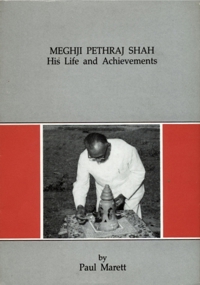
A great lover of virtue, Meghjibhai disliked hypocrisy. Whilst he would give generously for worthy projects he would never hesitate to expose insincerity and falsehood. Indeed, his truthfulness and outspoken frankness were so well known that the wrong sort of people rarely appreciated him. When he visited India he would spend some time in Bombay. Once, when some leading figures from Bombay put a scheme to him regarding educational institutions and cultural activities in large cities such as Bombay, Delhi and Ahmedabad he replied quite plainly 'Such matters are not for me. Let me work in my own way.' Meghjibhai's approach was quite simple. Whilst institutions in the big cities do not lack aid, there is very little assistance for projects to improve the condition of the middle and lower classes of society in the smaller towns and villages. These are the people who really need help and he never hesitated to contribute to schemes for their benefit. He would talk so kindly and sympathetically with those workers who came to ask him for help for those classes that they never felt that they were talking to a multimillionaire.
His wife Maniben always shared his feelings and activities. She made a valuable contribution to Meghjibhai's achievements. Although her own education was limited to four classes in the vernacular primary school, she has always been a strong advocate of the promotion of education. Like Meghjibhai himself, her way of life has always been simple and her outlook humble: for example at home she has always insisted on doing the cooking herself. Her name has been associated with a large number of institutions for ladies both in India and in Africa. Foundation stones of many institutions were laid under her auspices. She was always glad and proud to see her husband give donations of very large sums of money. Not surprisingly I the household of this great industrialist and philanthropist received a constant stream of visitors and guests. Maniben was always there to greet them with a smile. She never showed any weariness at offering hospitality: all people, of whatever class, who went to their house were greeted with equal charm and welcome. Thus Maniben's hospitality, simplicity and practical wisdom adorned Meghjibhai' s personal wealth and added to his reputation. Because of his simple habits and regular life Meghjibhai remained in good health throughout the years of hard work and he never had a long illness. His food and way of life were pure and simple and this is why he was able to stand the pace of a very busy life. He had some trouble and pain relating to blood vessels in the leg, which came on first in rough weather during a sea voyage to Japan. This caused him discomfort and difficulty of movement in his leg. As far as possible he avoided sea voyages altogether. An unfortunate accident, when he slipped on an icy road in London, left him for the last six years of his life with permanent muscular pain in his left shoulder. He had just left his favourite restaurant after lunch. It was snowing and the road was very treacherous. Meghjibhai slipped while crossing the road and fell very heavily, spraining his shoulder. Fortunately he had almost crossed the road; otherwise such an accident in London traffic might well have been fatal. Despite the best treatment the sprain never completely cleared up and he used to suffer considerable pain at times. Meghjibhai believed firmly in Karma and accepted the pain as predestined and never complained. He had strong faith in natural therapeutics and for six years relied on these remedies to the exclusion of other medicines.
Meghjibhai believed in fate. He believed that in this existence man gets the fruits of the Karma built up in his previous lives. He was interested in astrology as a science but felt that the prophecies and forecasts of the astrologers were unreliable. Astrology, he would say, has never been fully explored in a scientific manner. Its real scholars are few so he never relied on astrological predictions. In this he showed the critical understanding which served him well in various aspects of his business life. It is interesting to note that many auspicious events in his life were associated with the number 18, and he and his family came to regard this as their lucky number.
Anyone who looks at Meghjibhai's life and works superficially will wonder how his achievements came about. It was beyond the bounds of imagination that a simple teacher in a small Indian village would become a millionaire in East Africa. But this was no miracle but the result of hard work and conscious self development from childhood on. A child born in a poor family in a village is likely to develop a sense of inferiority. He begins to suffer a complex and if he is intelligent and ambitious this may well grow into bitterness in due course. If he is not able to get higher education his disappointment and embitterment can often increase and he turns against the society which he thinks is responsible for his poor, deprived condition. He may become jealous of that society and sometimes turns to radical action to avenge himself on society.
So much depends on the child's nurture and upbringing. Meghjibhai was brought up in such a situation but he did not develop an inferiority complex nor did he bear an aversion or hostility to society. The reason for this was the wholesome atmosphere in his family. Meghjibhai's father, Pethrajbhai, had deep faith in his religion. Like Indians in general, he accepted that his humble circumstances were ordained by fate and he was content with his lot. Pethrajbhai and his wife, Ranibai, were not ashamed of their poverty; they did not ape the rich nor use harsh words against others. Poor and rich were welcomed alike to their household. Meghjibhai's father eschewed all vanity and advised their children that a person's true wealth is his culture, a true sense of proper behaviour, faith and courtesy towards others. Even if a man is a millionaire, or if he is a great scholar, his wealth and learning are worthless without culture. It is this indefinable quality which earns the world's respect.
Pethrajbhai and Ranibai were not educated but they had more valuable gifts than education and wealth: they had religious faith and ancient Indian culture. From his earliest childhood, religious stories impressed themselves on Meghjibhai's tender mind. The maxim that truth prevails and untruth crumbles was strongly impressed upon him. As a result he developed the virtue of fearlessness. The firm belief that if one has truth on one's side, one need not be afraid of anybody, developed self-confidence in him. Meghjibhai's father, though he belonged to an older generation, was neither reactionary in his outlook nor severe in his bringing up of his children. If they made a mistake or did something wrong they were not beaten nor disparaged in front of others. Instead they would be gently and lovingly reproved. Pethrajbhai often said that children love self-respect and you will be respected if you respect others.
Thus Meghjibhai's modesty grew along with his self-confidence. From early childhood he had witnessed his father's life of hard work. So he had inherited the virtues of self-sufficiency and simplicity. His parents looked after the children as well as they could. They never economised at the cost of their children's comforts. Hoarding money is a sin. Pethrajbhai believed that if money was not made good use of, it was worth nothing and so he spent all his earnings on the nurture of his children. He never failed in hospitality or charity. The seeds of this generosity were planted in Meghjibhai and in course of time they grew and underlay his philanthropy in India and abroad. From his childhood years, Meghjibhai had conceived the ambition to improve the condition of his family and of his parents who devoted their lives to the welfare of their children without caring for their own future. The story of Ramchandra, who, true to his word, volunteered to go and stay in the forest for the sake of his father, and the story of Shravan who carried his blind parents in a 'doli' (litter) on pilgrimage to the holy places of India, and many similar stories had strengthened Meghjibhai's love for his parents and brothers.
Meghjibhai had always been very conscious of his duties and also of his ambitions. He studied diligently so that his father's efforts in educating him with hard-won earnings should not be wasted. Meghjibhai's memory was so sharp that he could remember anything he had heard once and he was consistently top of the class. He tried constantly to live up to his parents' ambition and faith in him and he never felt any particular conceit at regarding this as his first duty. At home he formed the habit of not starting his meal until he had made sure the others were served and at school he would offer his food around before eating. Unselfish in this way, he was equally unselfish with his knowledge and would unhesitatingly help those of his fellow pupils who were having difficulties with the lessons.
 Dr. Paul Marett
Dr. Paul Marett

